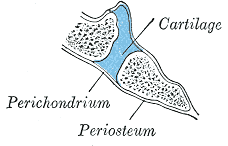A synchondrosis (or primary cartilaginous joint) is a type of cartilaginous joint where hyaline cartilage completely joins together two bones.[1] Synchondroses are different from symphyses (secondary cartilaginous joints), which are formed of fibrocartilage, and from synostosis (ossified junctions), which is the fusion of two or more bones. Synchondroses are immovable joints and are thus referred to as synarthroses.are all synchondroses synarthrotic/immovable[citation needed]
| Synchondrosis | |
|---|---|
 Sagittal section through the clivus of the skull demonstrating the location of the spheno-occipital synchondrosis in an infant. | |
| Identifiers | |
| TA98 | A03.0.00.016 |
| TA2 | 1529 |
| FMA | 7497 |
| Anatomical terminology | |
Examples in the human body
editPermanent synchondroses
edit- first sternocostal joint (where first rib meets the manubrium of the sternum)
- petro-occipital synchondrosis
Temporary synchondroses (fuse during development)
edit- epiphyseal plates
- apophyses
- synchondroses in the developing hip bone composed of the ilium, ischium and pubis
- spheno-occipital synchondrosis
References
edit- ^ Dixon, Andrew. "Synchondrosis | Radiology Reference Article | Radiopaedia.org". Radiopaedia. Retrieved 2020-06-12.